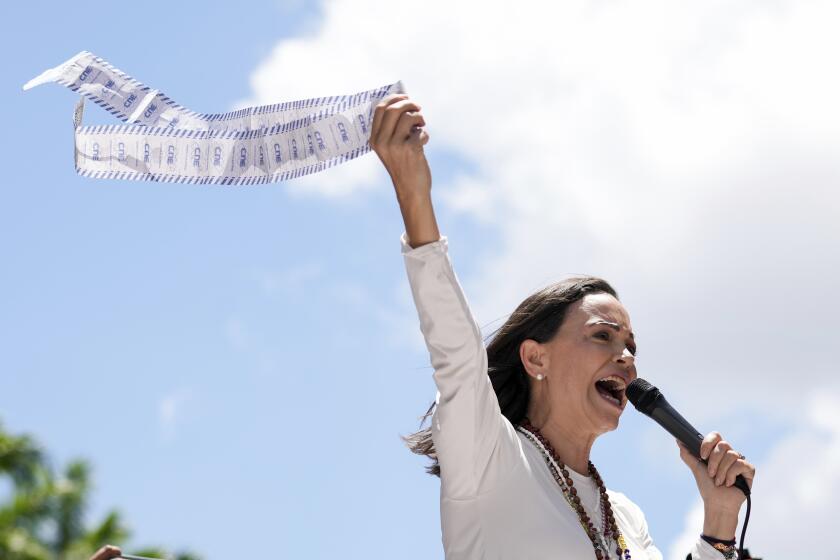Opinion: What Venezuela’s turn away from democracy means for U.S. migration

- Share via
In September, I went to the infamous Darién Gap. Over the last year and a half, more than 700,000 people have traversed this unforgiving slice of jungle that divides Colombia from Panama. It is so riddled with violence and rape that women there told me they have to travel with the morning-after pill.
About 68% of people crossing there are Venezuelans, heading north to seek safety. They are among the nearly 8 million who have fled their country in the last decade.
One family I met at the gap had fled Venezuela years ago and resettled in Colombia, where the parents had jobs and the children attended school and received medical care. Before the Venezuelan presidential elections in July, it seemed things were looking up and the country might return to democracy. Buoyed by this possibility, the family sold everything they had in Colombia and traveled back home to cast their votes. “We thought things were going to change,” the father told me.
In weeks of on-again, off-again demonstrations, the opposition’s rallying cry has been constant but so far ineffective.
They had reason to be hopeful. In October last year, the administration of President Nicolás Maduro and a coalition of opposition parties agreed to terms for free and fair elections in what was known as the Barbados Agreement. The day after the deal, the United States government offered to withdraw sanctions on Venezuelan oil, gas, sovereign bonds and gold.
But Maduro reneged on the agreement and instead cracked down on his critics, detaining political opponents and human rights defenders, disqualifying opposition candidates and prosecuting critics on politically motivated charges. In January, the U.S. restored some sanctions. Venezuela retaliated by refusing deportation flights from the U.S. and Mexico.
Despite the fears leading up to the elections, 60% of registered Venezuelans turned out to vote. But hours after polls closed, the electoral council declared Maduro the winner and refused to release tally sheets and conduct audits required by law.
A United Nations expert panel and the Carter Center questioned the result. Both verified that tally sheets published by the opposition were reliable, while the Carter Center noted that they proved that an opposition candidate, Edmundo González Urrutia, had won the election by a considerable margin.
Citizens organized mass protests across the country and were met with a brutal crackdown. Authorities and pro-government armed groups known as “colectivos” persecuted, killed and detained dissidents, protesters and even bystanders, some of them teenagers. Fearing for their lives, the members of the family I met were forced to flee their country again.
Their journey took them from Caracas to Necoclí in Colombia, where they were living on the beach under makeshift tents that barely protected them from inclement weather. They were stranded, trying to raise the $350 per adult and $150 per child charged by smugglers to cross the Darién Gap.
“I have great trust in my God. But I don’t know if he abandoned us,” the father told me.
Despite disingenuous scapegoating by Donald Trump and others, research shows immigrants are good for American business, employment and productivity.
The U.S. offer to soften sanctions to support the Barbados Agreement and restore rule of law in Venezuela was an important effort. Now that the transition appears to have failed, the U.S. should do more to ensure respect for the will of the Venezuelan people, such as imposing fresh sanctions on Maduro’s closest allies, including business people who support him, and using its diplomatic leverage over Cuba, which provides intelligence to Venezuela’s repressive machinery.
The U.S. should also uphold the rights of migrants and asylum seekers fleeing the crisis in Venezuela. Instead, it has put Venezuelans in further danger and undercut their access to asylum. Washington has pressed Mexico and other governments to impose visa requirements, making it harder for Venezuelans fleeing their country to fly to Central or North America. For many, the only option left has been to travel by land — often across Colombia toward Central America, through the perilous Darién Gap.
Surveys indicate that hundreds of thousands more Venezuelans are considering leaving the country. The U.S. should urgently reverse restrictions that force migrants into dangerous routes, stop outsourcing its migration controls to Mexico, Panama and other states with less capacity to consider refugee claims fairly, and avoid future deportations to countries where asylum seekers are likely to face abuse. In addition, it could demonstrate its commitment to the Venezuelan people by increasing the number of refugee resettlements granted to them. In fiscal year 2024, it admitted close to 13,000 Venezuelans and just over 25,000 people total from Latin America and the Caribbean, significantly less than the year’s cap for the region.
At the regional level, Washington should continue to establish and expand safe-mobility offices, which review resettlement requests in Colombia, Costa Rica, Ecuador and Guatemala and allow those eligible to fly to the U.S. and other countries in a safe and orderly manner. The U.S. government should also work with Latin American countries to create and strengthen legal pathways for protection, helping states in the region build capacity to process asylum claims and integrate Venezuelans.
The father of the family I interviewed in the Darién Gap told me that, despite looking for a “safe haven” in the U.S., they are holding on to the hope they can return home one day — to a country where their children can enjoy the safety and freedoms they did growing up. “I would like to go back to my Venezuela,” he said.
Tirana Hassan is executive director of Human Rights Watch.
More to Read
A cure for the common opinion
Get thought-provoking perspectives with our weekly newsletter.
You may occasionally receive promotional content from the Los Angeles Times.












